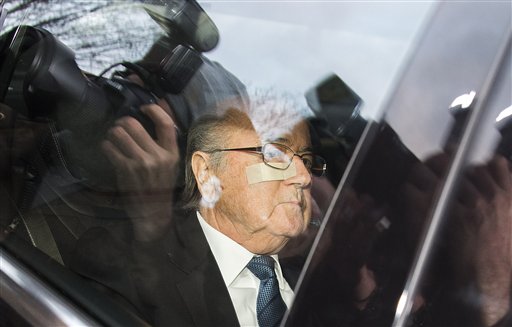Sepp Blatter faces judgment by FIFA ethics court he created

FIFA President Sepp Blatter arrives in a car at the FIFA headquarters “Home of FIFA” in Zurich, Switzerland. AP
ZURICH — In the waning days of his presidency, Sepp Blatter attempted to save his job Thursday (Friday Manila time) at the FIFA ethics committee he helped create and whose authority he does not recognize in his case.
The suspended FIFA president had been expected to tell four judges he is innocent of wrongdoing during the hearing at the headquarters of soccer’s governing body, the first time Blatter has entered the building since he was banned for 90 days in October.
Article continues after this advertisement“Blatter looks forward to a decision in his favor, because the evidence requires it,” Blatter’s lawyer, Richard Cullen, said in a statement after the hearing. “The evidence demonstrates that President Blatter behaved properly and certainly did not violate FIFA’s Code of Ethics. This investigation should be closed and the suspension lifted.”
With a large bandage on his face, Blatter arrived at FIFA headquarters shortly after 8 a.m. local time (0700 GMT) in a chauffeur-driven car for a hearing that was scheduled to start at9 a.m. A spokesman for Blatter, Thomas Renggli, said the Swiss official has had a minor procedure to treat a skin problem on his right cheek.
At 5 p.m., Blatter and lead lawyer Lorenz Erni drove away from the building without making any comment.
Article continues after this advertisementIn 2012, Blatter was key to empowering a tougher and more independent FIFA ethics committee that he now insists cannot remove an elected president.
“Now it has come back to haunt him,” Mark Pieth, a former anti-corruption adviser to FIFA, said this week.
Blatter risks a life ban if the verdict — due early next week — is guilty for approving a payment of about $2 million from FIFA to Michel Platini in 2011. Platini has also been banned for 90 days.
Otherwise, Blatter could be banned for several years for a conflict of interest between the two longtime FIFA executive committee colleagues. He is also likely to be quizzed about falsifying FIFA accounts.
In a Swiss television interview last month, Blatter said it is “humiliating” for a FIFA president to be barred from office by his own ethics committee. He also said the ethics committee he ushered in after a previous corruption crisis had no right to take him down.
Only the FIFA congress can remove a president, Blatter said at the time.
In July 2012, FIFA moved from an in-house committee monitoring unethical conduct to a two-chamber group of prosecutors and judges with freedom and funding to pursue cases.
Pieth led a group of anti-corruption experts and soccer officials who steered Blatter and FIFA toward modernizing reforms from 2012-14. Not all were accepted, but the two-chamber ethics court was crucial.
“It must be said that he (Blatter) was the one who pushed it through congress,” Pieth, a Swiss professor of law, said in a telephone interview. “That was the moment we all believed he is serious, at least about the letter of the changes.”
Blatter complained about the ethics committee’s power to Russian news agency TASS after his 90-day ban was imposed.
“They can be independent but they don’t need to be against me,” he was quoted as saying in October.
Blatter was charged by the ethics committee after Switzerland’s attorney general opened criminal proceedings against him for the payment to Platini, who is boycotting his own ethics hearing on Friday.
The case centers on Platini getting about $2 million of FIFA money as uncontracted salary for working as Blatter’s presidential adviser in 1999-2002.
Platini asked for a salary of 1 million Swiss francs. Blatter has said the former France international had a contract for 300,000 Swiss francs, plus a “gentleman’s agreement” to get the rest later.
Swiss law obliged FIFA only to pay the deferred money within five years but Platini, by then UEFA president, reportedly asked for the balance in 2010 and was paid in February 2011.
The timing has raised suspicion, coming months before a presidential election when UEFA urged its members to support Blatter against Mohamed bin Hammam of Qatar. Blatter won unopposed after Bin Hammam was implicated in bribing Caribbean voters.
On Thursday, Blatter also faces questions about false accounting because FIFA’s debt to Platini was not recorded in financial reports from 2002-2011.
“The first part of the payment is in the accounts, the second no, but I am not a FIFA accountant,” Blatter said in an interview with Italian sports daily Gazzetta dello Sport this week. “And what was or wasn’t in the accounts, was a debt to pay.”
If he is found guilty, Blatter can appeal to FIFA and the Court of Arbitration for Sport.